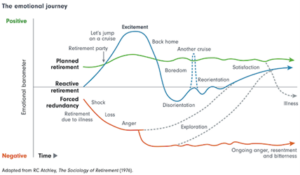According to recent analysis from KPMG, the average retirement age for Australians is the highest it’s been since the 1970s. More people over the age of 55 are staying in the workforce than ever before, whether through choice or necessity.
Retirement is a significant life event for the vast majority of Australians. Most of us will have mixed emotions around the end of our working life and the beginning of our ‘second half’. For some it will be a relief, and something they have long planned for and are looking forward to, but for others it will be a source of anxiety. This anxiety could be due to many factors including concerns about running out of money, a perceived sense of loss of identity or a lack of routine/control among other factors.
It will come as no surprise that wealth and health are important for anyone heading into retirement, but there are other factors that can be more important in determining the life satisfaction for retirees.

Surprising results on retirement happiness
A survey of over 1,500 Australians over the age of 50 by Fidelity International, drilled into the many factors driving happiness for retirees, with some surprising results.
The survey found that the top four drivers of overall life satisfaction for experienced retirees – i.e. those with more than 10 years living in retirement – were:
- purpose
- control
- confidence, and
- emotional experience.
Emotional experience relates to the sense of optimism and contentment that retirees feel. It was the strongest driver of overall life satisfaction and significantly more important that health and wealth.
Positive emotional experiences often correlate with retirement journeys that have been well considered and planned, or ones which – if things didn’t go as planned – have had a Plan B or backup plan. Negative emotional experiences are often felt by those people who may not have planned adequately and may have been forced into retirement through job loss or other factors out of their control.
Emotional roller coaster
This chart is a useful illustration of what range of emotions are possible during a retirement journey.

The green line shows that the emotional experience of a well-planned and prepared retiree is usually fairly steady with low stress levels and a generally positive emotional experience.
In contrast, the journey of the reactive retirement is much more variable where the lack of planning can lead to significant swings in lived emotional experience.
The journey of the person forced into retirement through an unplanned redundancy is much more unpredictable and can be a difficult period from an emotional perspective. However, it can also be turned around with the right mindset and often with the help of a good financial adviser, as the alternative paths highlight.
Regardless of your individual circumstances, it’s never too late to plan for your retirement. If you need help along the journey to a better retirement, get in touch with one of our friendly advisers today by calling Align Financial on (02) 9913 9995.